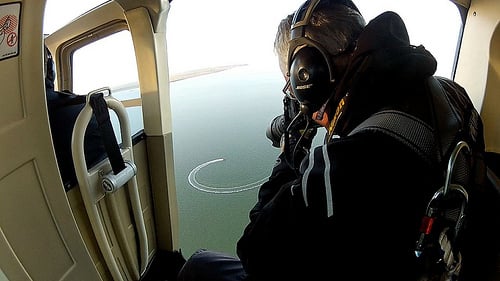
A photographer at work over Whitstable
Photo: Richard Earland
Prosperous partnerships
Collaborations with a yacht club, fishermen and many others are set to increase engagement in the arts in the Canterbury region. Lucy Johnson describes the ‘Prosper’ project.
Canterbury Festival, an Arts Council of England (ACE) National Portfolio Organisation, is continually striving to maintain a year-round presence as a strategic leader in the region, driving forward new projects and supporting the local arts scene. This is in addition to its primary purpose of programming national and international performance. The festival has been eager to lead a project that engages more deeply with the wider arts scene in East Kent and that contributes to increasing the cultural capacity of the region. We are pioneering a new model of culture-led transformation through sustainable creative practice called ‘Prosper’, which has been designed and produced by the MAP Consortium and Workers of Art and is funded by ACE.
Prosper was born with the objective of investigating how collaboration could conjure possibilities and new opportunities for everyone. The Map Consortium is a national organisation with experience in artist and partnership development and Workers of Art provided strong networks across the region and experience in producing innovative programmes.
Most excitingly, Prosper has allowed us to get to know organisations outside the sector
A number of gatherings took place between June and August 2012. These events featured stimulating speakers, guidance and provided support to help potential collaborators to seek out partners and raise ideas. Thirteen projects received investments of up to £5,000 to enable them to research and carry out a small but practical ‘experiment’, led by three main partners, one of whom had to be from outside the cultural sector. Prosper established a principle of experimentation and innovation over anticipated outcomes, seeking to support those ideas and partnerships that genuinely offered the chance of something extraordinary around the key areas of place-making work, social and organisational change or interdisciplinary collaboration. The entire process was supported by a number of ‘labs’, sessions with all participants and facilitators that offered advice and concentrated thinking about the projects.
The final stage of the project is currently taking place, with five 'adventures' receiving a much larger investment to complete a full project. One project is further developing a sound installation of nightingale song in Margate High Street as a result of positive feedback from local police on a reduction of anti-social behavior. Another is specialising in using digital technologies to create a new dance aesthetic and explore the connections between movement and wellbeing in older people. A third is creating a boat art installation/market stall intervention, which links the situation of artists and the fishing industry in seaside towns to the theme of sustainability.
Perhaps one of the most imaginative collaborations is ‘White Horses’. This has brought together artist Tracey Falcon, Whitstable Yacht Club and Canterbury Christ Church University. Their experiment saw them take aerial photographs of the yacht club in action, which they transferred into a spectacular collage of images on a yacht sail that has toured around various boat shows. At one event over 9,000 people engaged with the piece, providing almost unanimously positive feedback. The team will now create a flotilla of sails printed with commissioned artworks, offering an unexpected gallery experience on sea and shore.
A student makers market was the idea of the newly formed community interest company, Future Foundry, the Canterbury City Partnership and Canterbury Market, working with students from all three universities in Canterbury. As there was no moderation for inclusion, this project relied purely on students having the drive and initiative to take part, but even the freezing temperatures and a 4am start did not deter the participants with over twenty stalls at the first market. Visitors and stallholders alike were a new audience for the festival as historically students are a group the festival has found difficult to engage.
Not every project was entirely successful: drop-out, lack of direction and over-ambition were some of the downsides to the freer model of evaluation. However, by allocating a member of the Prosper team to each experiment, this was minimised and lessons have been learnt from every process, whatever its outcome.
While Prosper’s main objectives were to raise awareness and to widen the festival’s engagement with the cultural sector in the region, it was never meant to directly translate into increased ticket sales. Through Prosper the festival team has worked closely with individual artists and newly formed companies while also continuing to engage with some of the main bodies in the region like the universities and the councils. Most excitingly, Prosper has allowed us to get to know organisations outside the sector, such as the Whitstable Yacht Club, the Deal fishermen and the Margate Town team, where previously there had been no relationship.
East Kent has recently submitted a bid to be crowned the UK Capital of Culture 2017 and it is a particularly apt time for that to have happened. With the opening of the Turner Contemporary, the Marlowe Theatre and the Beaney House of Art and Knowledge, the developments in Folkestone and the burgeoning collaborative spirit, the region has a feeling of animation and transformation. This is very much the spirit of Prosper.
To date, Prosper has directly benefitted 39 individuals and organisations, and indirectly engaged with thousands. An event during this year’s festival will explore the results of the various projects and it is hoped that many of the collaborations will continue working together beyond the end of the funding. We would consider that a job well done.
Lucy Johnson is the Marketing Manager for Canterbury Festival.
www.prospertogether.co.uk
www.canterburyfestival.co.uk
Join the Discussion
You must be logged in to post a comment.